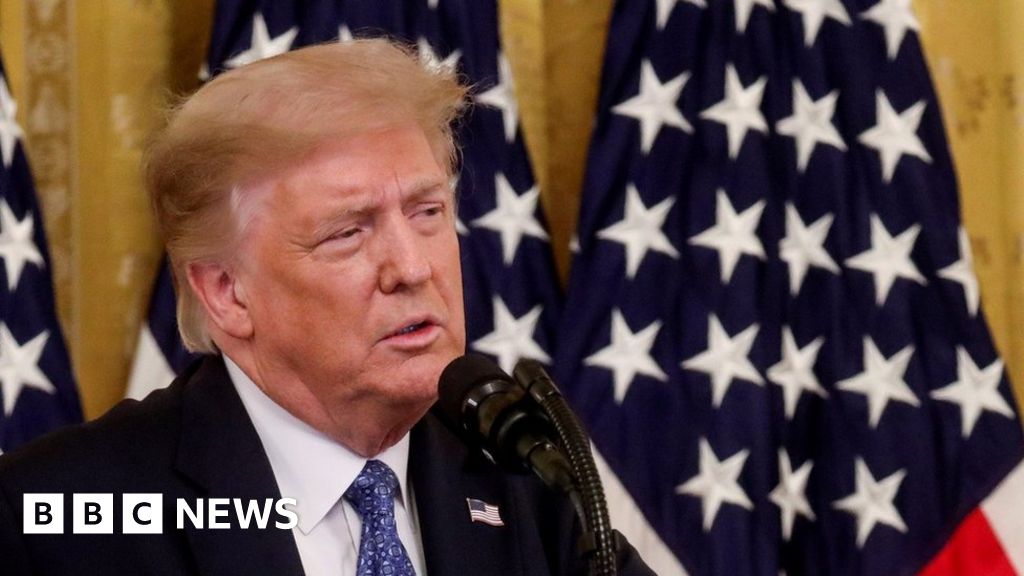
Donald Trump has called for November's presidential election to be postponed, saying increased postal voting could lead to fraud and inaccurate results.
He suggested a delay until people can "properly, securely and safely" vote.
There is little evidence to support Mr Trump's claims but he has long railed against mail-in voting which he has said would be susceptible to fraud.
US states want to make postal voting easier due to public health concerns over the coronavirus pandemic.
In a series of tweets, Mr Trump said "universal mail-in voting" would make November's vote the "most inaccurate and fraudulent election in history" and a "great embarrassment to the USA".
He suggested - without providing evidence - that mail-in voting, as it is known in the US, would be susceptible to foreign interference.
"The Dems talk of foreign influence in voting, but they know that Mail-In Voting is an easy way for foreign countries to enter the race," he said.
Mr Trump also said postal voting was "already proving to be a catastrophic disaster" in areas where it was being tried out.
- Does US postal voting lead to ‘tremendous fraud’?
- Could Donald Trump delay the presidential election?
In June New York allowed voters to vote by post in the Democratic primary poll for the party's presidential candidate. But there have been long delays in counting the ballots and the results are still unknown.
US media report that there are also concerns that many ballots will not be counted because they were not filled in correctly or do not have postmarks on them that show they were sent before voting officially ended.
However, several other states have long conducted votes by post.
Donald Trump can't delay November's presidential election without Congress, partially controlled by the Democrats, first approving the decision. If he didn't already know this, someone has certainly told him by now.
The president also must know that tweeting about a delay - even framed as an "I'm just asking!" question - is sure to ignite a political firestorm, particularly after he has repeatedly refused to say whether he'd accept an adverse result in the upcoming presidential election.
Trump appears to be doing everything in his power to undermine the credibility of November's vote, in which a record number of Americans are predicted to rely on mail-in voting to avoid the risk of exposure to the coronavirus. He's repeatedly made false and misleading claims about the reliability of the mail balloting and suggested broad conspiracy theories. Critics warn that he could be laying the groundwork for contesting the results - although the purpose may be simply to give him a scapegoat if he loses.
Trump's Thursday morning tweet could also be an attempt to divert attention away from the truly dismal second-quarter economic numbers just released. He's been relying on a financial turnaround to breath life into his re-election campaign, and instead the outlook appears exceedingly gloomy.
Whatever the reason, tweeting about an election delay is not the move of a candidate confident of victory - and could be a sign of more desperate moves to come.
Reacting to Mr Trump's suggestion, Democratic Senator from New Mexico Tom Udall said there was "no way" Mr Trump could delay the election.
"But the fact that he is even suggesting it is a serious, chilling attack on the democratic process. All members of Congress - and the administration - should speak out," he said.
Earlier this month, six US states were planning to hold "all-mail" ballot elections in November: California, Utah, Hawaii, Colorado, Oregon and Washington. Other states are considering it, according to a postal voting campaign group.
These states will automatically send postal ballots to all registered voters, which then have to be sent back or dropped off on election day - although some in-person voting is still available in certain limited circumstances.
About half of US states allow any registered voter to vote by post on request.
Critics of postal voting argue that people could vote more than once via absentee ballots and in person. Mr Trump has in the past said there was a risk of "thousands and thousands of people sitting in somebody's living room, signing ballots all over the place".
However, there is no evidence of widespread fraud, according to numerous nationwide and state-level studies over the years.
https://news.google.com/__i/rss/rd/articles/CBMiM2h0dHBzOi8vd3d3LmJiYy5jby51ay9uZXdzL3dvcmxkLXVzLWNhbmFkYS01MzU5Nzk3NdIBN2h0dHBzOi8vd3d3LmJiYy5jby51ay9uZXdzL2FtcC93b3JsZC11cy1jYW5hZGEtNTM1OTc5NzU?oc=5
2020-07-30 13:30:10Z
52780951232721
Tidak ada komentar:
Posting Komentar